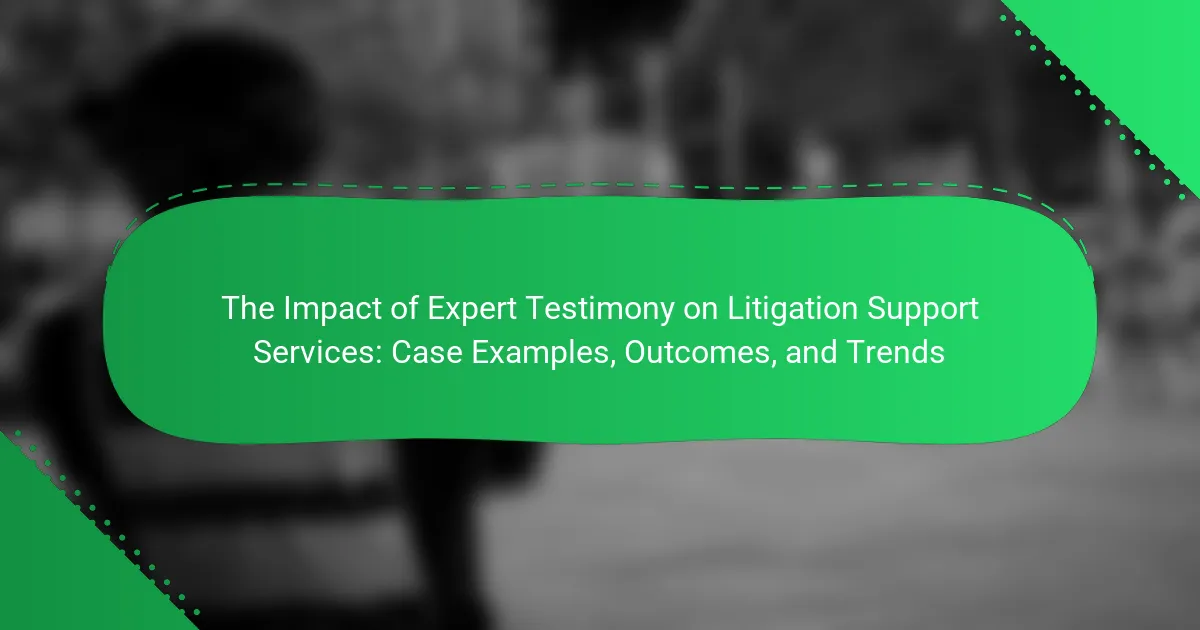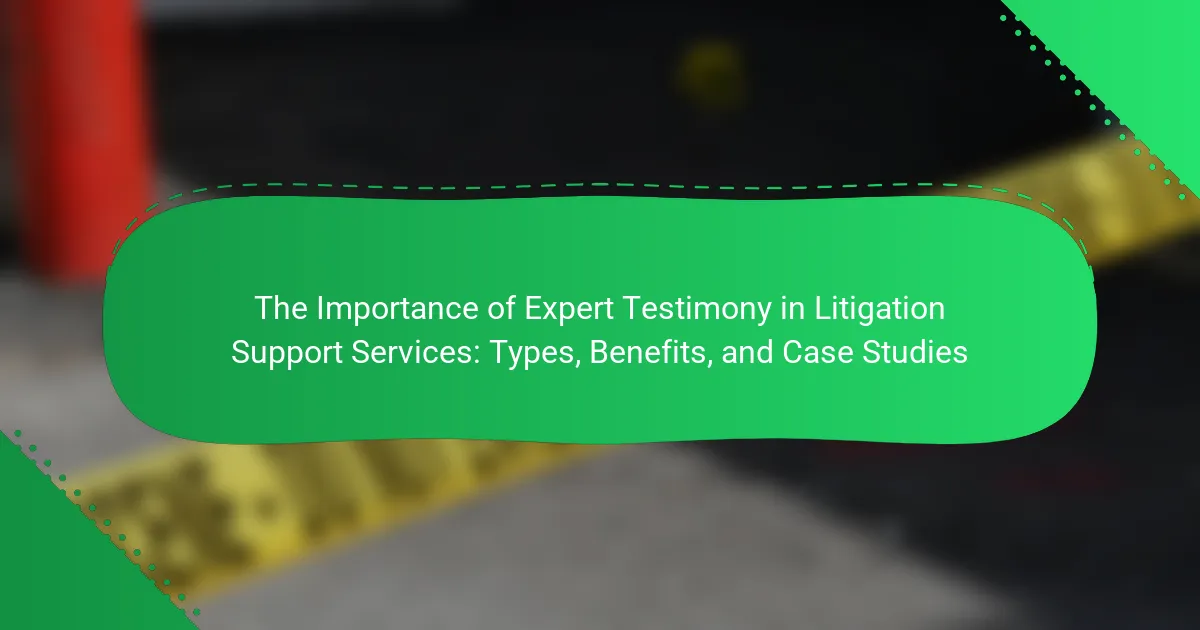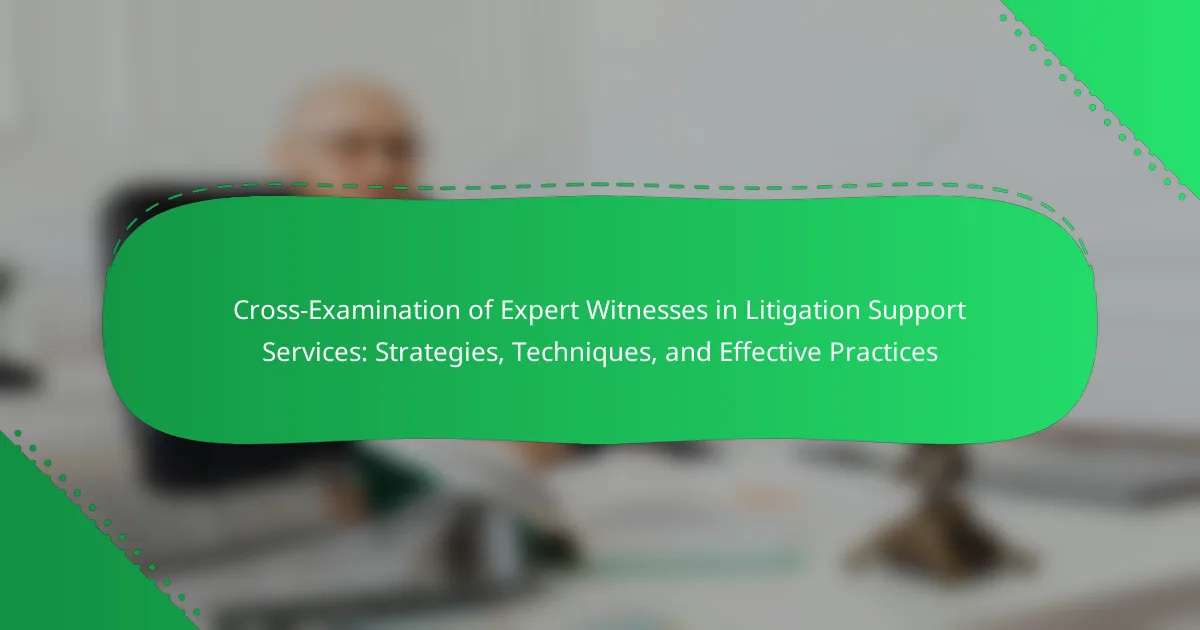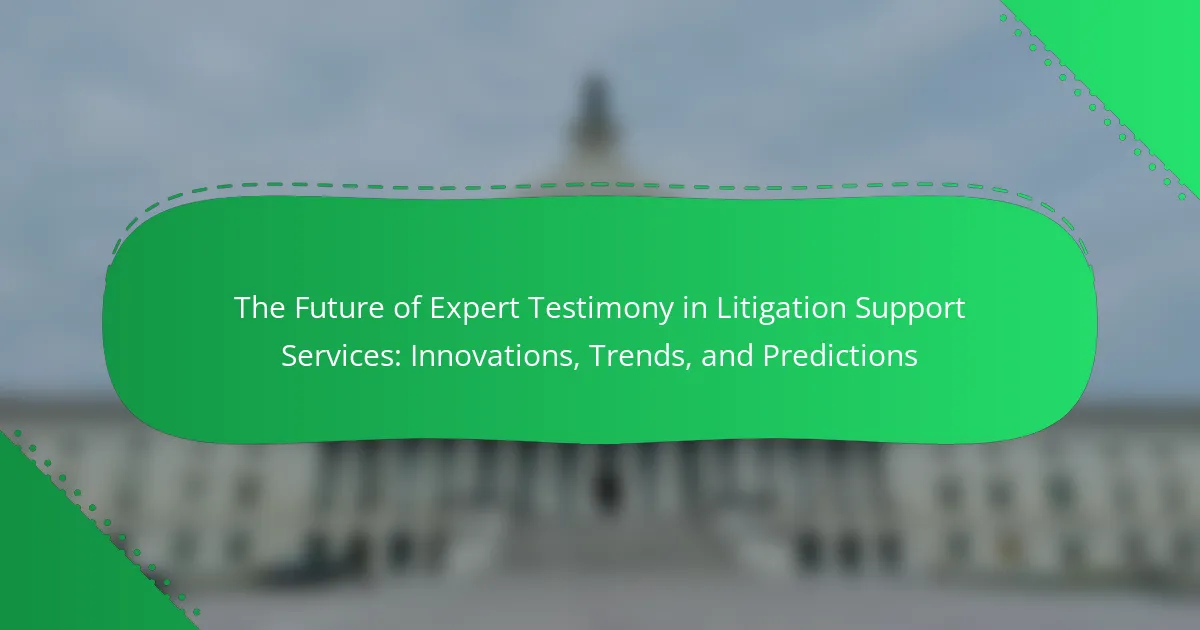Expert testimony is a crucial component of litigation support services, providing specialized knowledge that clarifies complex issues for the court. This article examines the impact of expert testimony on legal proceedings, highlighting case examples and outcomes that illustrate its significance. It discusses how expert witnesses interpret evidence and validate methodologies, thereby enhancing the credibility of legal arguments. Additionally, the article explores current trends in the use of expert testimony and its decisive role in jury deliberations and judicial decisions, particularly in technical fields such as medical, financial, and engineering matters.
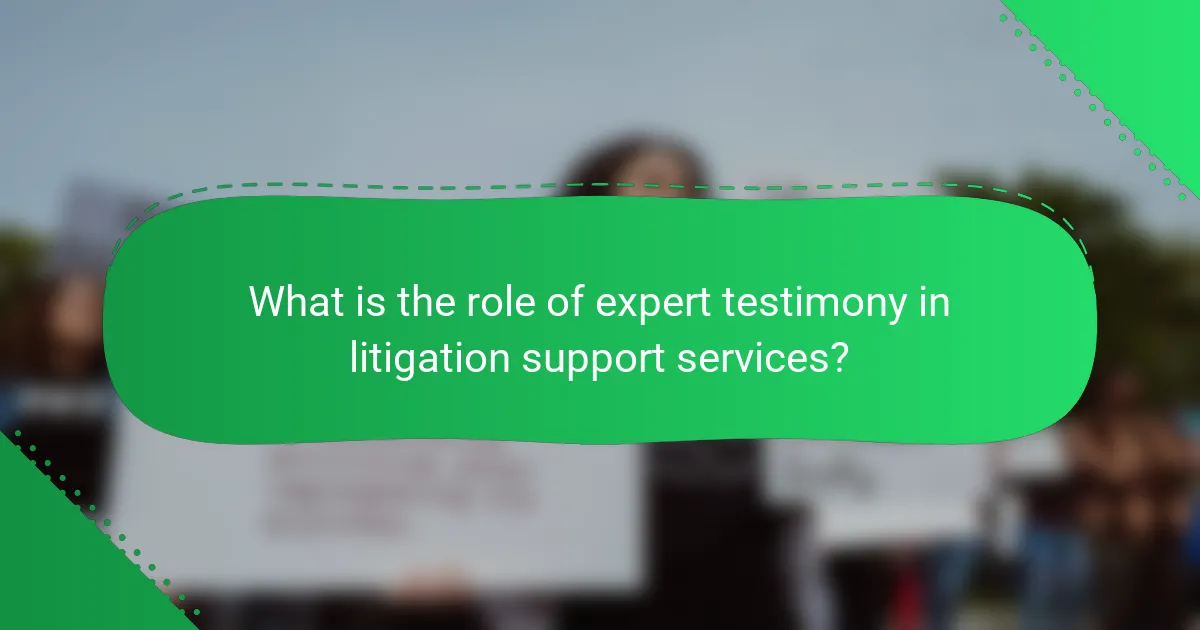
What is the role of expert testimony in litigation support services?
Expert testimony plays a critical role in litigation support services. It provides specialized knowledge that helps clarify complex issues for the court. Expert witnesses offer opinions based on their expertise, which can influence case outcomes. They assist in interpreting evidence and can validate methodologies used in investigations. Their insights often help attorneys build stronger cases. Courts rely on expert testimony to understand technical subjects, such as medical, financial, or engineering matters. This testimony can enhance the credibility of the arguments presented. Ultimately, expert testimony can be decisive in jury deliberations and judicial decisions.
How does expert testimony influence the outcome of legal cases?
Expert testimony significantly influences the outcome of legal cases by providing specialized knowledge. This knowledge helps judges and juries understand complex issues. Experts clarify technical details that are beyond the average person’s comprehension. Their credibility can sway opinions in favor of one party. Research shows that cases with expert testimony are more likely to result in favorable verdicts for the side presenting the expert. A study by the National Center for State Courts indicated that expert witnesses can increase the likelihood of winning a case by up to 20%. Additionally, expert testimony can affect settlement negotiations, often leading to more favorable terms. The presence of credible experts can enhance the perceived strength of a case.
What types of cases benefit most from expert testimony?
Cases that benefit most from expert testimony include medical malpractice, product liability, and criminal defense cases. Medical malpractice cases require specialized knowledge to establish standards of care. Expert witnesses can clarify complex medical issues for the jury. In product liability cases, experts can explain defects and safety standards. Their insights help determine causation and negligence. Criminal defense cases often involve forensic experts who analyze evidence. Their testimony can significantly influence the outcome by challenging prosecution claims. Additionally, complex financial disputes benefit from expert economic analysis. Experts provide clarity on financial implications and industry standards.
How do juries perceive expert testimony during trials?
Juries generally perceive expert testimony as credible and influential. Expert witnesses are viewed as authorities in their fields. This perception can enhance the jury’s understanding of complex issues. Studies show that jurors often rely on expert testimony to make informed decisions. For example, a study by the National Center for State Courts found that jurors are more likely to favor a case when expert testimony is presented. Additionally, expert testimony can clarify technical details that jurors may not grasp otherwise. Overall, the presence of expert witnesses significantly impacts jury deliberations and verdicts.
What are the key attributes of effective expert testimony?
Effective expert testimony is characterized by credibility, clarity, relevance, and objectivity. Credibility is established through the expert’s qualifications and experience in the subject matter. Clarity involves the ability to communicate complex information in an understandable manner. Relevance ensures that the testimony directly addresses the issues at hand in the case. Objectivity means providing unbiased opinions based on facts and evidence. These attributes enhance the persuasiveness and reliability of the testimony in legal proceedings.
What qualifications should an expert possess to provide credible testimony?
An expert should possess relevant education, experience, and credentials to provide credible testimony. Relevant education includes advanced degrees in their field of expertise. Experience refers to practical application of knowledge in real-world scenarios. Credentials may include certifications or licenses that validate their qualifications. Experts should also have a history of published work or research in their area. This demonstrates their authority and knowledge. Courts often assess these qualifications to determine the expert’s reliability. A well-documented background increases the likelihood of the testimony being accepted.
How does the clarity of presentation impact the effectiveness of expert testimony?
Clarity of presentation significantly enhances the effectiveness of expert testimony. Clear communication helps juries and judges understand complex information. When experts present their findings in an organized manner, it reduces confusion. Research shows that jurors are more likely to retain information when it is clearly articulated. A study published in the Journal of Forensic Sciences indicates that clarity directly correlates with perceived credibility. Experts who use visual aids and straightforward language are often more persuasive. This clarity can influence case outcomes by strengthening the argument presented. Overall, effective presentation is crucial for the impact of expert testimony in legal settings.
What trends are emerging in the use of expert testimony?
Emerging trends in the use of expert testimony include increased reliance on technology and data analytics. Legal professionals are leveraging advanced tools for case preparation. This enhances the effectiveness of expert testimonies. Additionally, there is a growing emphasis on interdisciplinary expertise. Experts from various fields are collaborating to provide comprehensive insights. The demand for experts with strong communication skills is also rising. Clear and engaging presentations are becoming essential in court. Moreover, remote testimony has gained popularity due to the pandemic. Virtual platforms allow experts to testify from any location. These trends reflect the evolving landscape of litigation support services.
How is technology changing the landscape of expert testimony?
Technology is transforming expert testimony by enhancing communication and analysis. Digital tools allow experts to present complex data visually. This aids in comprehension for judges and juries. Online platforms facilitate remote testimonies, increasing accessibility. Video conferencing reduces travel costs and time. Advanced analytics software improves the accuracy of expert evaluations. Artificial intelligence assists in case research and evidence analysis. These innovations lead to more efficient and effective legal processes.
What are the implications of remote testimony in litigation support?
Remote testimony in litigation support allows witnesses to provide their statements from a location outside the courtroom. This method increases accessibility for expert witnesses who may be unable to travel. It also reduces costs associated with travel and accommodations. Remote testimony can expedite the litigation process by allowing for quicker scheduling of witness appearances. However, it may raise concerns about the authenticity of the testimony and the ability to assess credibility. Courts have adapted to this method by implementing specific guidelines and technology requirements. Studies show that remote testimony can be as effective as in-person appearances when proper protocols are followed. The implications of remote testimony include both increased efficiency and potential challenges in witness evaluation.
What are notable case examples demonstrating the impact of expert testimony?
Notable case examples demonstrating the impact of expert testimony include the 1995 O.J. Simpson trial. In this case, forensic expert Dr. Henry Lee provided critical analysis of evidence. His testimony helped establish reasonable doubt regarding the prosecution’s case. Another example is the 2004 case of Daubert v. Merrell Dow Pharmaceuticals. This case set standards for admissibility of expert testimony in federal courts. The ruling emphasized that expert opinions must be based on reliable methods. In the 2012 case of Kumho Tire Co. v. Carmichael, the Supreme Court affirmed the trial judge’s role in evaluating expert testimony. These cases illustrate how expert testimony can influence jury perceptions and case outcomes.
Which landmark cases highlight the significance of expert testimony?
The landmark cases that highlight the significance of expert testimony include Daubert v. Merrell Dow Pharmaceuticals, Kumho Tire Co. v. Carmichael, and Frye v. United States. In Daubert, the Supreme Court established standards for admitting expert testimony based on relevance and reliability. This case emphasized the role of judges as gatekeepers in evaluating scientific evidence. Kumho Tire expanded the Daubert standard to all types of expert testimony, not just scientific. Frye set the precedent that expert testimony must be generally accepted within the relevant scientific community. These cases collectively underscore the critical role expert testimony plays in legal proceedings.
How did expert testimony influence specific case outcomes?
Expert testimony significantly influenced specific case outcomes by providing specialized knowledge that informed the court’s decisions. In many legal cases, expert witnesses clarify complex issues beyond the understanding of the average juror or judge. For instance, in the landmark case Daubert v. Merrell Dow Pharmaceuticals, the U.S. Supreme Court established standards for admissibility of expert testimony, impacting how courts evaluate scientific evidence. This case set a precedent that shifted the burden of proof regarding the reliability of expert testimony to the trial judge. Consequently, expert testimony can determine the outcome of cases by either supporting or undermining claims based on scientific validity. In personal injury cases, for example, expert medical testimony often establishes causation, directly influencing jury awards. Overall, expert testimony serves as a critical factor in shaping legal outcomes by providing clarity and authority on specialized subjects.
What challenges do experts face in providing testimony?
Experts face several challenges in providing testimony. These include the complexity of the subject matter. Experts often need to simplify intricate concepts for a lay audience. This can lead to misunderstandings or misinterpretations. They also encounter pressure from opposing counsel during cross-examination. This can create a stressful environment that affects their performance. Additionally, experts must adhere to strict ethical standards. Violating these can result in losing credibility. Another challenge is the potential for bias. Experts must remain objective despite personal beliefs or external influences. Lastly, time constraints can hinder thorough preparation. Limited time may affect the quality of their testimony. These challenges impact the effectiveness of expert testimony in litigation.
What are common criticisms of expert testimony in the courtroom?
Common criticisms of expert testimony in the courtroom include issues of bias, lack of scientific validity, and overreach of expertise. Bias can arise when experts have financial ties to one party, potentially skewing their testimony. Lack of scientific validity occurs when expert opinions are based on unreliable methods or insufficient data. Overreach happens when experts venture beyond their area of expertise, leading to misleading conclusions. Additionally, the complexity of expert testimony can confuse juries, impacting their decision-making. These criticisms highlight the need for careful vetting of expert witnesses to ensure credibility and relevance in legal proceedings.
How can experts prepare to overcome these challenges?
Experts can prepare to overcome challenges by enhancing their knowledge and skills. Continuous education in their respective fields is essential. Attending workshops and conferences helps them stay updated on industry trends. Networking with other professionals can provide valuable insights and support. Practicing effective communication skills is crucial for delivering clear testimony. Familiarizing themselves with legal processes and terminology is also important. Engaging in mock trials can help experts refine their presentation techniques. Lastly, seeking feedback from peers can identify areas for improvement.
What best practices should be followed when utilizing expert testimony?
Utilizing expert testimony requires adherence to several best practices. First, select experts with relevant credentials and experience. Their qualifications should align with the specific subject matter. Second, ensure that the expert’s testimony is based on reliable methods and principles. This adherence to established standards enhances credibility. Third, prepare the expert thoroughly for deposition and trial. Familiarity with the case details is crucial for effective communication. Fourth, present the expert’s qualifications clearly to the court. This establishes authority and trustworthiness. Fifth, anticipate and prepare for cross-examination. This readiness can strengthen the expert’s position. Research indicates that juries often weigh expert testimony heavily when it is well-presented and credible. Therefore, following these best practices can significantly impact the outcome of litigation.
How can legal teams effectively select and collaborate with experts?
Legal teams can effectively select and collaborate with experts by following a structured approach. First, they should identify the specific expertise required for the case. This involves understanding the case’s nuances and the relevant field of knowledge. Next, legal teams can conduct thorough research to find qualified experts. They should evaluate the experts’ credentials, experience, and past performance in similar cases.
Once potential experts are identified, legal teams should conduct interviews to assess compatibility. This helps ensure that the expert can communicate complex ideas clearly. Establishing clear expectations and roles is essential for collaboration. Legal teams should outline the scope of work and deadlines for deliverables.
Regular communication is crucial throughout the collaboration process. This ensures that both parties remain aligned on objectives and progress. Finally, legal teams should gather feedback from the expert post-collaboration to improve future selections. This systematic approach enhances the effectiveness of expert involvement in litigation.
What strategies enhance the presentation of expert testimony in court?
Effective strategies to enhance the presentation of expert testimony in court include clear communication, visual aids, and rehearsal. Clear communication ensures that the expert conveys complex information understandably. Using visual aids, such as charts or diagrams, can simplify data presentation. Rehearsing testimony allows experts to refine their delivery and anticipate questions. Engaging storytelling techniques can also make expert testimony more relatable. Additionally, establishing credibility through qualifications and experience strengthens the expert’s authority. Tailoring the testimony to the audience’s level of understanding is crucial for impact. These strategies collectively improve the clarity and effectiveness of expert testimony in legal proceedings.
What are the future prospects for expert testimony in litigation support services?
The future prospects for expert testimony in litigation support services are promising. Increased reliance on specialized knowledge is expected. As cases become more complex, the demand for expert witnesses will rise. Experts provide clarity on technical issues that juries may not understand. This trend is supported by the growing number of cases requiring expert analysis. According to the National Center for State Courts, expert testimony is crucial in over 60% of civil cases. Additionally, advancements in technology are enhancing the effectiveness of expert testimony. Virtual consultations and online platforms are making expert services more accessible. Overall, expert testimony will continue to play a vital role in litigation support services.
How might changes in law impact the role of expert witnesses?
Changes in law can significantly impact the role of expert witnesses. New regulations may alter the criteria for admissibility of expert testimony. This can affect which experts are deemed qualified to testify in court. For instance, stricter standards may require experts to have more specialized training or credentials. Additionally, changes in laws regarding liability or damages can shift the focus of expert testimony. Experts may need to adapt their methodologies to align with new legal frameworks. Moreover, evolving laws could influence the types of cases requiring expert witnesses. This can lead to an increased demand for experts in emerging fields. Overall, legal changes can reshape the landscape of expert testimony in litigation.
What skills will be essential for experts in the evolving legal landscape?
Experts in the evolving legal landscape will need strong analytical skills. These skills enable professionals to interpret complex legal data and identify trends. Communication skills are also essential for effectively conveying findings to non-experts. Adaptability is crucial as legal technologies and regulations continue to change rapidly. Knowledge of technology, including legal research tools and case management software, is increasingly important. Understanding of data privacy laws is vital due to the rise in digital evidence. Collaboration skills are necessary for working with multidisciplinary teams. Finally, ethical reasoning is critical to navigate the complexities of legal standards and practices.
The main entity of the article is expert testimony and its impact on litigation support services. The article examines the critical role of expert testimony in clarifying complex issues for the court, influencing case outcomes, and enhancing the credibility of legal arguments. It discusses the types of cases that benefit most from expert testimony, the perception of juries, and the key attributes of effective testimony. Additionally, it explores emerging trends, challenges faced by experts, notable case examples, and best practices for utilizing expert testimony in legal proceedings. The article concludes with insights on the future prospects of expert testimony in the evolving legal landscape.
